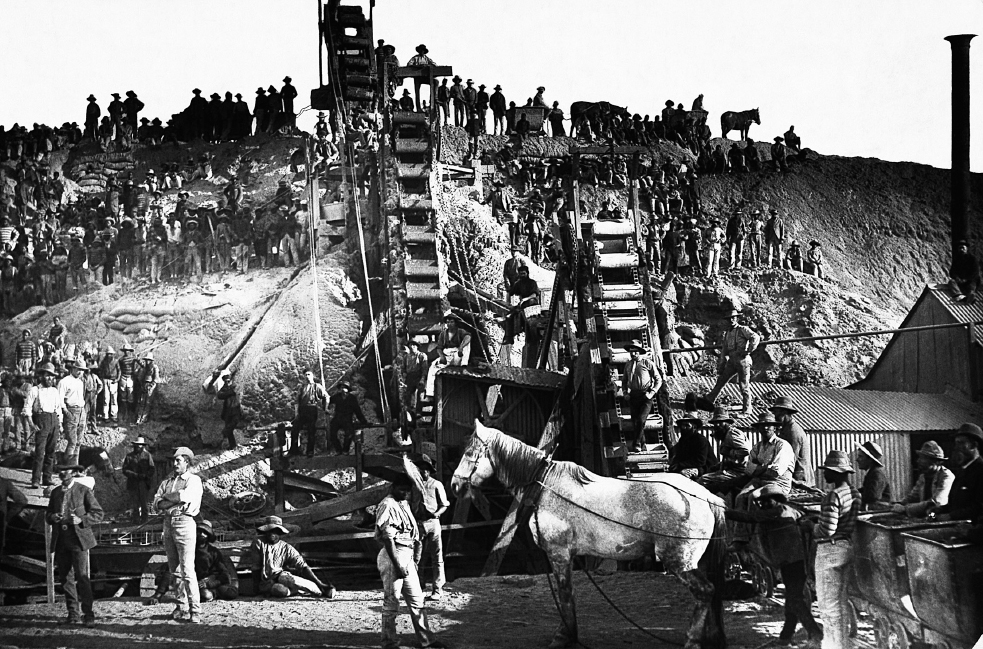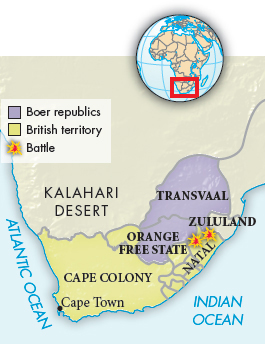Southern Africa in the Nineteenth Century
The development of southern Africa diverged from the rest of sub-Saharan Africa in important ways. Whites settled in large numbers, modern capitalist industry took off, and British imperialists had to wage all-out war.
When the British took possession of the Dutch Cape Colony during the Napoleonic Wars, there were about twenty thousand free Dutch citizens and twenty-five thousand African slaves, with substantial mixed-race communities on the northern frontier of white settlement. After 1815 powerful African chiefdoms, Dutch settlers — first known as Boers, and then as Afrikaners — and British colonial forces waged a complicated three-cornered battle to build strong states in southern Africa.
While the British consolidated their rule in the Cape Colony, the talented Zulu king Shaka (r. 1818–1828) was creating the largest and most powerful kingdom in southern Africa in the nineteenth century. Shaka’s wars led to the creation of Zulu, Tswana, Swazi, Ndebele, and Sotho states in southern Africa. By 1890 these states were largely subdued by Dutch and British invaders, but only after many hard-fought frontier wars.
Between 1834 and 1838 the British abolished slavery in the Cape Colony and introduced racial equality before the law to protect African labor. In 1836 about ten thousand Afrikaner cattle ranchers and farmers, resentful of equal treatment of blacks by British colonial officials and missionaries after the abolition of slavery, began to make their so-called Great Trek northward into the interior. In 1845 another group of Afrikaners joined them north of the Orange River. Over the next thirty years Afrikaner and British settlers reached a mutually advantageous division of southern Africa. The British ruled the strategically valuable colonies of Cape Colony and Natal (nuh-TAL) on the coast, and the Afrikaners controlled the ranch-land republics of Orange Free State and the Transvaal in the interior.
The discovery of incredibly rich deposits of diamonds in 1867 near Kimberley, and of gold in 1886 in the Afrikaners’ Transvaal Republic around modern Johannesburg, revolutionized the southern African economy, making possible large-scale industrial capitalism and transforming the lives of all its peoples. The extraction of these minerals, particularly the deep-level gold deposits, required big foreign investment, European engineering expertise, and an enormous labor force. Thus small-scale miners soon gave way to powerful financiers, particularly Cecil Rhodes (1853–1902). Rhodes came from a large middle-class British family and at seventeen went to southern Africa to seek his fortune. By 1888 Rhodes’s firm, the De Beers mining company, monopolized the world’s diamond industry and earned him fabulous profits.

Diamond Mining in South AfricaAt first, both black and white miners could own and work claims at the diamond diggings, as this early photo suggests. However, as the industry expanded and was monopolized by European financial interests, white workers claimed the supervisory jobs, and blacks were limited to dangerous low-wage labor. (Robert Harvey/© Hulton-Deutsch Collection/Corbis)
The mining bonanza whetted the appetite of British imperialists led by the powerful Rhodes. Between 1888 and 1893 Rhodes used missionaries and his British South Africa Company, chartered by the British government, to force African chiefs to accept British protectorates, and he managed to add Southern and Northern Rhodesia (modern-day Zimbabwe and Zambia) to the British Empire.
Southern Rhodesia is one of the most egregious examples of Europeans misleading African rulers to take their land. In 1888 the Ndebele (or Matabele) king, Lobengula (1845–1894), ruler over much of modern southwestern Zimbabwe, met with three of Rhodes’s men, led by Charles Rudd, and signed the Rudd Concession. Lobengula believed he was simply allowing a handful of British fortune hunters a few years of gold prospecting in Matabeleland. Lobengula had been misled, however, by the resident London Missionary Society missionary (and Lobengula’s supposed friend), the Reverend Charles Helm, as to the document’s true meaning and Rhodes’s hand behind it. Even though Lobengula soon repudiated the agreement, he opened the way for Rhodes’s seizure of the territory.

The Struggle for South Africa, 1878
The Transvaal gold fields still remained in Afrikaner hands, however, so Rhodes and the imperialist clique initiated a series of events that sparked the South African War of 1899–1902 (also known as the Anglo-Boer War). Often considered the first “total war,” this conflict witnessed the British use of a scorched-earth strategy to destroy Afrikaner property, and concentration camps to detain Afrikaner families and their servants, thousands of whom died of illness.
The long and bitter war divided whites in South Africa, but South Africa’s blacks were the biggest losers. The British had promised the Afrikaners representative government in return for surrender in 1902, and they made good on their pledge. In 1910 the Cape Colony, Natal, the Orange Free State, and the Transvaal formed a new self-governing Union of South Africa. After the peace settlement, because the white minority held almost all political power in the new union, and because Afrikaners outnumbered English-speakers, the Afrikaners began to regain what they had lost on the battlefield. South Africa, under a joint British-Afrikaner government within the British Empire, began the creation of a modern segregated society that culminated in an even harsher system of racial separation, or apartheid, after World War II.

